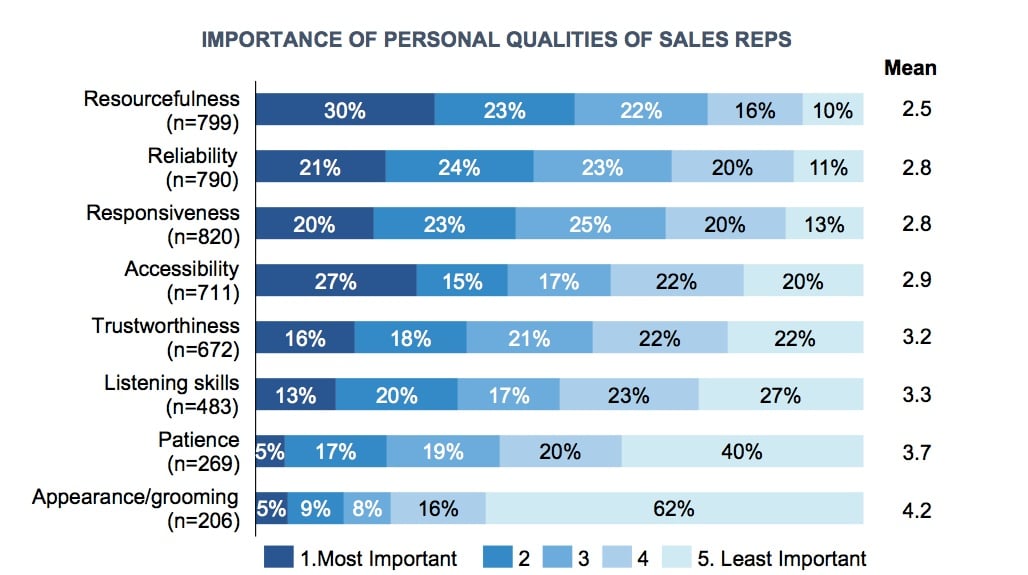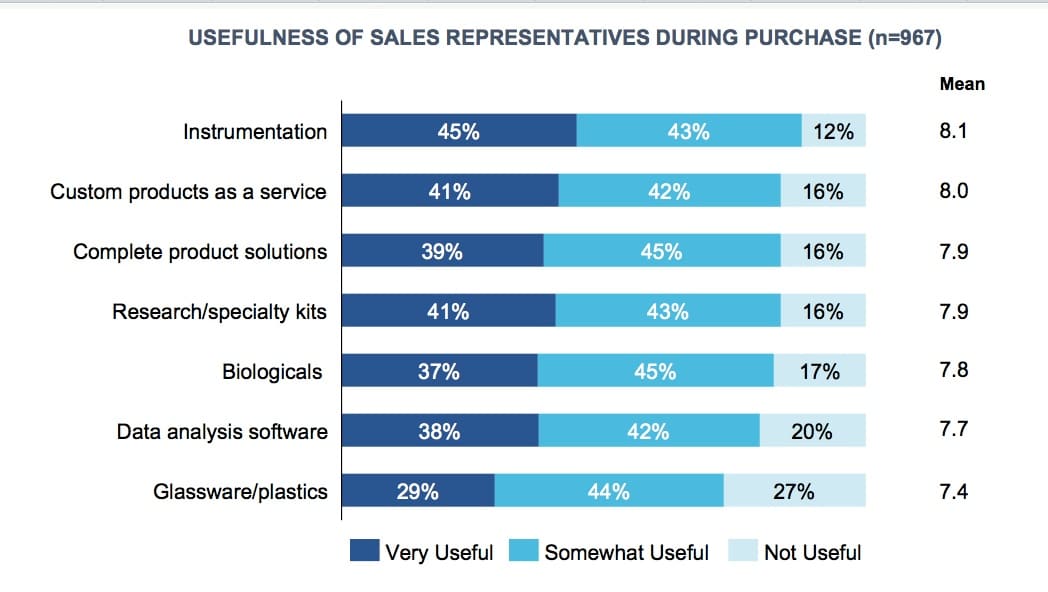The Continuously Evolving Life Science Sales Rep
Recently we released our report, Maximizing Sales Rep Effectiveness for the Life Sciences. The report was based on a survey of almost 1,000 life scientists from around the world at both academic and pharma/biotech accounts. Our clients use this report in a variety of ways – from sales training to benchmarking the performance of their reps against their competitors.
This is always one of our most popular reports because of the undeniable importance of sales reps in this market. If you’ve heard any of my presentations or read any of my articles before you may recall that I stress the importance of an integrated marketing communications program and building brand equity in a market where purchase decisions are often made in the realm of belief and familiarity rather than a dispassionate assessment of product performance specs.
You may also recall that the scientists we’ve surveyed point to the importance of digital information sources in guiding their purchase decisions. Indeed, when we ask scientists to rank their preference for ways of learning about new products, sales reps are one of the least popular means of interacting with a vendor.
“Sales representatives are largely obsolete. Individuals with purchasing authority and those that make purchasing recommendations often have sufficient information available through research and references to make these decisions. In some cases, competitive information is withheld at the privilege of the sales rep, which impedes the aforementioned research and reduces the likelihood of a purchase.”
— Comments of a Survey Respondent
But when we probe deeper than a mere ranking we find that sales reps are still an essential element of the marketing mix, and often a key determinant of a successful sale. Scientific customers who tend to discount the influence of reps in their purchase decisions also recognize the value of a good rep who can help solve their problems.
I recognize that most of those reading this article here know far more about scientific sales than I do…and I know that our clients invest heavily in recruiting, training and motivating their sales force. Some of what I discuss here may even be intuitively obvious to you but I suspect you’ve never seen it statistically-proven before. One of the major weaknesses of even the most successful companies is a tendency to talk only to themselves and to make decisions based on gut instinct or conventional wisdom. BioInformatics Inc.’s research is designed to provide companies with an independent view from the most important perspective of all – that of the customers who buy their products.
Personal Qualities
When you’re recruiting a person for a sales position you probably look at both their personal qualities and professional qualifications. So do your customers! So in this question we asked the scientists surveyed to rank the importance of these seven personal qualities.
As you can see, the three most importance personal qualities of sales reps are responsiveness, resourcefulness, and reliability.

What this suggests to me is that scientists are looking for a rep they can depend on…the person who will be there when they’re needed and use their imagination help them solve the customer’s problems. You have to remember that for a sales person, a sale is often the culmination of a long process that began with a lead, then perhaps a phone call or a demo, and finally ended with a PO! Hooray – we got a sale, now let’s move on to the next prospect!
But from the scientist’s perspective, the sale initiates a relationship. They have an expectation that their rep will continue to play an important supporting role in their research.
Professional Qualities
We also asked what professional qualities they feel are most important. By a large margin, the single most important professional quality a rep can possess is a thorough understanding of how their products work and what they’re capable of. They do not expect their rep to be a “colleague” or a “partner in research.” They’re not looking for their reps to be renowned experts in gene expression or protein analysis – that’s the scientist’s job.
What scientists do expect is that their reps will be experts in the one thing they are not – your company’s products. If your reps are not fully conversant in every detail of what they’re selling, they will not be considered credible, and all the other great qualities a rep may bring to the table will be diminished.
When Scientists Want Assistance
Ask a scientist what they’re most likely to do when a rep walks into a lab unannounced, the answer is usually one word: HIDE.
Most people, especially scientists, shy away from direct interactions with sales people. But we all know that sales people play a key role in helping us identify products we might consider purchasing, they help us understand a product’s suitability for our application, and they may even show us how to use it.
First, scientists state that it’s important for their reps to make them aware of new products. Like all consumers, scientists have trouble staying abreast of new technological developments in their field, or improved versions of what they’re already using. So conveying this kind of information about your company’s “latest and greatest” is both valuable and welcome.
“I think that life science sales representatives will still be important in establishing and maintaining relationships with individual accounts/institutional accounts as a method to deliver news regarding changes and new products. While e-commerce is making routine and repeat purchases easier, ecommerce provides too many choices that washes out the ability for busy researchers to find new and alternative products. I think the sales representatives can fill this knowledge gap. Plus, I always like to work with professional sales representatives who schedule visits and provide information.”
— Comments of a Survey Respondent
We also learned that scientists aren’t particularly keen on learning about “related” products. This may be a natural tendency to resist being sold “add-ons” but probably also reflects a sort of linear thinking when it comes to purchases…“this is my need, let’s fix this and not be distracted by all of these other widgets in your catalog.”
We know that scientists aren’t just looking for information about products, in the end they also want to buy them. And here, they see a very important role for their reps. Note how much larger the percentages are for scientist’s describing the importance of a rep’s involvement in each of these activities compared to the previous chart. They may be somewhat ambivalent about needing a rep’s help them find a product but they sure want that rep to help them when a problem arises.
The “take home” point is that in many cases the rep is the personification of your company – its public face. When something goes wrong with an order any distinctions you may have between sales and customer service are irrelevant to the scientist. The rep sold him the product so the rep is who they expect to solve the problem!
We also asked “For which type of product purchase is the assistance of a sales rep most valuable?” It probably comes as no surprise to you that the more complex or expensive a product is, the more scientists will rely on the assistance of a sales rep in making a purchase decision.

We also asked under what circumstances the assistance of a rep is most valuable and scientists told us they welcome the assistance of a rep when using a new technique or application. I think this highlights again the point I made earlier…scientists see a sale as the beginning of a relationship…they have an expectation that the rep is going to be there to help them take advantage of whatever wonderful possibilities your product now makes possible. Again, different companies set up their sales forces differently and have different philosophies and responsibilities but from the other side of the lab bench there is an expectation that a rep will also provide education and support after the sale is made.
Post-Sale Support
Scientists do have an expectation that their reps should be there to help them whether it’s with an order that’s been lost, or with a product that’s not performing as expected. The reality, however, is that in many cases reps don’t provide this kind of post-sales support – it’s left to other people or departments within the company. But is a market where it’s often hard to establish differentiation, there’s a great opportunity to improve the way customers are supported after a sale is made – and reps in the field are in a unique position to do this.
Sales Force Organization
Earlier I mentioned that it’s hard for your reps to be an expert in all things…here we show what might be a solution for you. We asked the scientists how they thought your sales force should be organized and they answered “by scientific discipline.”
If it’s at all possible, and relevant to your product line, organizing your reps by scientific discipline may give you a better chance of capitalizing on scientists’ increasing desire for “one stop shopping” as well as the ability to build a reputation for excellence that transcends the boundaries of geography and product categories. But it will probably also require that you recruit reps with fairly extensive scientific training in that discipline.
A less popular choice was a sales force organized by geography even though that might be the most efficient and economical way from the supplier’s perspective. Unfortunately, that’s the hard part about this job…the scientists we survey aren’t as concerned about your problems as they are their own!
The Future of The Scientist/Sales Rep Relationship
Anecdotally scientists have told us they’re running into more reps who appear to have been hired for their sales skills than their scientific knowledge. They’re interacting more frequently with reps who don’t know all they need to know about the products they’re selling and when the scientist needs information they’re more likely to search on the Web than they are to call their local rep…and thus more likely to learn about a competitor’s product.
“A sales rep plays an important role in showing the customer that they matter. They help to head off problems that might otherwise cause a customer to get frustrated and change brands. Sales reps are the critical human face of the company and are often the first responders when a critical problem needs to be solved when a product is not working properly. Good sales reps are able to cut through red tape at a company to get things done.”
— Comments of a Survey Respondent
I think if I had to summarize this unique report, it would be that people in general, and scientists in particular, do not like to be “sold to”. They do like to be helped and supported. They want to feel that they are in control of the interaction between themselves and their suppliers. So by understanding how your customers want to be helped at each stage of the sales cycle – and beyond – you’ll be better able to recruit and train the people who will provide you with a lasting competitive advantage.
About This Report
In this report, more than 950 scientists weigh in on acceptable response times for questions and concerns, preferences for types of outreach (i.e., email, text, video chat, telephone or face-to-face) and services that are considered value-added (e.g., forwarding lab requests to R&D, apprising labs of green options, inviting scientists to participate in focus groups). Additionally, scientists indicate whether or not they would be willing to follow supplier reps on social media, and if so, what type of content would entice them to do so.
The 37-question survey also identifies ways that sales reps can alienate their customers by contacting the lab too much (or too little), not understanding the products well and lacking of familiarity with the lab’s area of research, to name a few of the issues.
We also benchmark satisfaction with lab suppliers on multiple attributes to highlight the companies that are getting it right and the ones that could stand to improve. All of the data are analyzed by region the increasingly important segmentation – age.
Designed for CEOs, presidents, general managers, vice presidents of sales, sales directors, sales managers and sales reps alike, Maximizing Sales Rep Effectiveness for the Life Sciences can be used by any stakeholder to inform sales strategies and tactical plans that will help to achieve — and exceed — sales goals.
Be sure to visit or report catalog to take advantage of year end savings!





